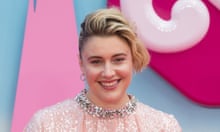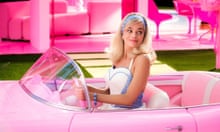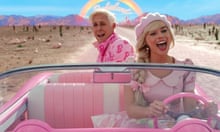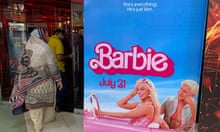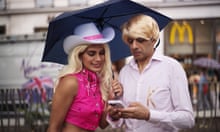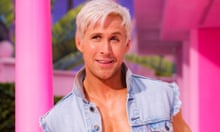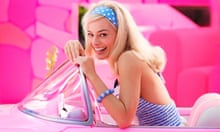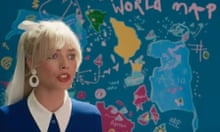One night in April, a stranger I met in a pub pulled out his phone and showed me pictures of something he was working on. We were in a town near to the Leavesden film studios, where the stranger had been constructing sets for Barbie, a film co-written and directed by the American filmmaker Greta Gerwig. “You have to see this,” the man said, before presenting images of a hot-pink, human-sized Barbieland, a place he described as an antidote to our hideously cold winter. Rain was forecast the following day, and even colder cold, but the stranger couldn’t care less. He would be a world away.
When I tell Gerwig this story, over Zoom, one day in June, her large eyes brighten. “That makes me feel like a proud mama!” she says, and, “Gosh, that makes me tear up.” Over the hour we spend together, while she sits in Manhattan, in a room she describes as “half office, half baby nursery,” this is the kind of pronounced buoyancy I come to expect from her. Even when I suggest the stranger perhaps shouldn’t have shown me the pictures – the set being locked down, me being a journalist – Gerwig says, in a wink-wink tone, “But I love that he felt he wanted to.”
Gerwig was invited to write Barbie by the actor Margot Robbie who, with Warner Bros, had bought the rights to the film. (Robbie stars in Barbie as Barbie.) Gerwig has said she was terrified to accept the job. “It’s not like a superhero, who already has a story. It felt very much like it was going to be an adaptation. Except what we were adapting is a doll – an icon of the 20th century.” Before writing the script, Gerwig thought: “It felt complicated enough, sticky enough, strange enough, that maybe there could be something interesting there to be discovered.” She didn’t know she was going to direct the film until after the script was written. “I kind of had two thoughts: I love this and I can’t bear it if anyone else makes it. And: they’ll never let us make this movie.”
To pitch Barbie to executives, Gerwig wrote a poem so strange and “surreal” that she will not read it to me now. When I ask what it concerned, she says, “Oh, you know, the lament of Job?” before adding, “Shockingly, it does actually communicate some vibe of the movie.” Gerwig wrote Barbie with her partner, the filmmaker Noah Baumbach, though for a while she didn’t tell him she’d enlisted his help. (“He was like, ‘Did you sign us up to write a Barbie movie?’ And I was like, ‘Yes, Noah, get excited!’”) They worked on the script during the pandemic, when doubt plagued the future of the communal cinema experience. “There was this sense of wanting to make something anarchic and wild and completely bananas,” Gerwig says, “because it felt, like, ‘Well, if we ever do get to go back to cinemas again, let’s do something totally unhinged.’” The anarchy of Gerwig’s Barbie comes from “the deep isolation of the pandemic,” she says – “that feeling of being in our own little boxes, alone.”
Such are the levels of secrecy around Barbie that I was only allowed to watch the first 20 minutes of the film, which I did in a large screening room, alone but for a projectionist, a Warner Bros employee, and a man who sealed my phone in an opaque bag. Watching 20 minutes of a film is not enough to say if it is good or not, but it is enough to confirm an early vibe, which is anarchic. There is colour and artificiality, fun and chaos. There are many Barbies and many Kens. It has the atmosphere of an over-the-top gender-reveal party during which various things go wrong. Barbie’s feet become flat, not stiletto-arched. Her shower runs cold. Her breakfast burns. She develops neuroses. A once perfect-seeming life becomes not perfect.
Partway through an elaborate, multi-cast dance number, Robbie asks, suddenly: “Do you guys ever think about dying?” Gerwig thinks of this line as being demonstrative of the film’s anarchic energy. When I ask in what other ways the film is anarchic, she replies, not quite answering the question, “Oh. This movie is crazy.”
I ask her to describe it. “There were so many ways to go into it,” she says, before listing some. “The idea of Barbieland. The idea of Barbie herself being constrained in multitudes. The idea that self is dispersed among many people, that all of these women are Barbie and Barbie is all of these women. That’s pretty trippy to begin with. And the sense that she is continuous with her environment. That there really is no internal life, at all. Because there is just no need to have an internal life.”
Barbie was conceived in 1959, by Ruth Handler, who co-founded the doll’s manufacturer Mattel. Barbie has since occupied a complicated position in the lives of her owners. On one hand, she has been terrible for girls’ body image, a fact Gerwig acknowledges playfully in the film’s opening 20 minutes. (On discovering Barbie’s flat feet, several other Barbies, and at least one Ken, heave mawkishly and knowingly in disgust.) But according to fans she has empowered, too. In more recent times, Mattel has produced dolls with different skin colours and in different shapes. While researching Barbie, Gerwig toured the company’s headquarters. “The kind of amazing thing is that Barbie went to the moon before women had the ability to get credit cards,” she says. “That’s crazy. She was always a kind of step ahead.”
At Mattel, Gerwig saw an image of an all-female Barbie presidential ticket. “I was like, ‘Huh, so Barbie’s done it, but we haven’t?” (The first presidential Barbie appeared in 1992; in the film, president Barbie is played by Issa Rae.) Gerwig was fascinated. “As an icon, she’s always been complicated,” she says. “She has always had these two sides to her.”
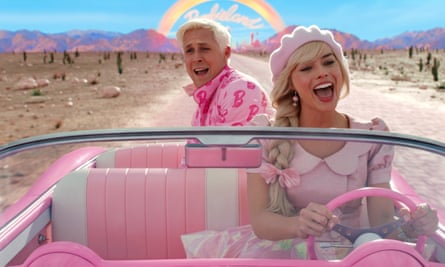
Growing up, Gerwig had a tangled relationship with the doll. “I was always intrigued,” she says, because, “Barbie was, if not exactly forbidden in our house, well, it was not encouraged.” Why not? “Oh, the usual criticisms. ‘If she was a real woman, she wouldn’t even be able to stand up; she wouldn’t be able to support her head.’ My mum was a child of the 60s. She was like, ‘We got this far, for this?’” Eventually, Gerwig’s mother relented. “She got me my own,” Gerwig recalls. “Fresh out the box.” It replaced the neighbourhood hand-me-downs she had been playing with.
But Gerwig already had a strong connection to other dolls, the kind you mother, and she had a vivid imagination. “I played with dolls until… I don’t want to say too late, but I played with them long enough that I didn’t want kids at school to know I still played with them. I was a teenager. I was about 13 and still playing with dolls. And I knew that kids at that point were already kissing.” She smiles. “I was a late bloomer.”
Gerwig has said that Barbie’s story mimics that of a girl’s journey from childhood to adolescence. “I always think that 8, 9, 10 years old is peak kid. I was brash and unafraid and loud and big. And then, you know…” Puberty. “It’s a shrinking. Wanting to make yourself smaller, less noticeable, take in all that spikiness and bury it. And you’re profoundly uncomfortable, because you’re going through metamorphosis, literally.” You begin to introspect. “But also, you’re getting tall. You’re getting your period. You get spots.” Gerwig describes childhood as being at peace with the world and adolescence as being suddenly not. “My experience of it was wanting to hide.”
I ask, “Is the film about growing up?”
“It’s not about growing up, exactly,” she says. “But in a way… This is about Barbie, an inanimate doll made out of plastic. But the movie ends up, really, about being human.”
In many ways, the themes in Barbie chime with those Gerwig has tackled previously, not least in Lady Bird, her loosely autobiographical directorial debut, and a 2019 adaptation of the Louisa May Alcott novel, Little Women, which the critic Anthony Lane said, “may just be the best film yet made by an American woman”. Both films star Saoirse Ronan and feature adolescent women becoming new, more complicated versions of themselves. Gerwig was nominated for best director at the Oscars for Lady Bird – she became only the fifth female director to be nominated for the award. If Lady Bird announced Gerwig as a top-tier filmmaker, Little Women confirmed it. Plaudits followed. Hollywood invited her in. But Barbie is different altogether: bigger budget, bigger anticipation – what might be the first true summer blockbuster, post-pandemic. When I ask Gerwig how she feels about the film’s release, she says, “I’m just so nervous. I’m so nervous. I’m excited! But I’m so nervous.” And then: “I just can’t believe, like, here it is… Let’s go!”
Before filming, Gerwig organised a Barbie sleepover at Claridges, the London hotel, and invited a number of the film’s female cast: Robbie, Rae, America Fererra. The Kens were invited, but asked not to spend the night; the Barbies wore pyjamas and played games. “Honestly, it just felt like it would be the most fun way to kick everything off,” Gerwig says. “And it’s something you don’t get to do that much as an adult. Like, ‘I’m just going to go have a sleepover with my friends…’”
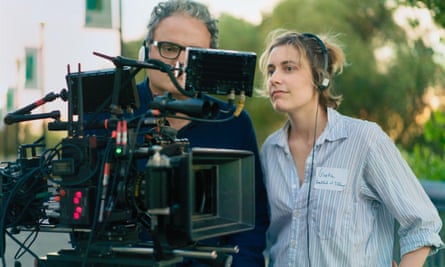
Gerwig is known for creating open, democratic sets. And she describes part of her job as “creating an atmosphere of acceptance, no wrong answers, no judgment. It allows people to feel safe, to bring wonderfully wild things to the table, which they otherwise might not want to.” (“She’s into things arising,” the actor Jamie Demetriou, who appears in Barbie, told me.) That everyone on set bonds is important to Gerwig – hence the sleepover. Before Little Women, she asked the film’s primary cast – Ronan, Florence Pugh, Emma Watson and Eliza Scanlen – to memorise a poem, and to later recite it to each other. “These were professional actors,” Gerwig recalls, “but there was something about the fact they had to select a poem and then recite it… It was very intimate and amazing, and they were very vulnerable. It instantly felt helpful in creating that connection.” She later adds: “As a director, you have the job of dreaming up the movie, and then you have to get everyone else in the movie – hundreds of people – to have that same dream, too.”
Demetriou recalls the Barbie set being full of positivity. “A lot of the film I spent with Will Ferrell and Connor Swindells talking about how there was this magical drip-down effect from her,” he told me, “this positive vibe that everyone wanted to keep going.”
On Zoom, I ask Gerwig, “Do you consider yourself a positive person?”
“I do,” she says. “I mean, not always.”
Then she gives a kind of sideways answer. “I like people,” she says. “I don’t know if that counts as being positive. But I do like other people. I’m interested in other people. It’s one of the reasons I like living in New York City. I like seeing people, running into people. I wouldn’t do well alone in the woods.”
Behind her I see strangers walking past a window at street-level. When I ask if it is people who make her happy, she says, “Completely,” and then, “I’m an extrovert. I’m a city person. I think no matter where I was born, I would have liked to have been where the action is.”
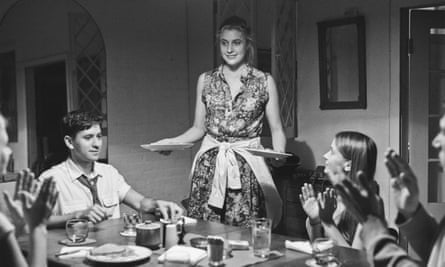
Gerwig was born in Sacramento, California, in 1983. There was some action there, but not a lot. As a child she was an avid reader. Often she would read at the dinner table and get into trouble for it, because it was prohibited. Sometimes her mother would borrow parenting books from the library. “I would pilfer them,” Gerwig says, “and be like, ‘What’s this garbage?’” She goes on, “I’ve always been this way, sort of a written-word junkie. It doesn’t even have to be good…” At school she was “a real rule follower.” She also “had a ton of energy,” she says. “Now, as an adult, I have ADHD – they diagnosed me. But as a kid, my mum was like, ‘Let’s sign her up for every activity. Let’s tire her out.’ I’ve always had a tremendous amount of enthusiasm. I was just interested in, like, everything. I had a really active imagination. I had a lot of really deep feelings. I was emotional.”
Gerwig’s mother was a nurse. Her father worked for a credit union. She has suggested previously that her parents should have become artists. When I bring this up, she says, “In a way, they kind of were.” Her father recorded his dreams, which “is quite an artistic thing to do.” (Gerwig does it, too.) He introduced her to Steve Martin’s standup and to the Monty Python songbook. (“One of the reasons to learn piano is to sing and play Monty Python songs.”) The family often visited the Sacramento Philharmonic, and her mother bought secondhand clothing and repurposed it. “It was almost like she was a costumer – she created beauty everywhere she went.” Gerwig grew up among adults who weren’t professional artists, but who “were artistic in deep ways in their lives. And I think part of seeing all of that enabled me to go for it, playfully and regardless of how it worked out. It can be a deep part of your existence, whether or not somebody gives you money for it.” Of her parents she says, “They organised their life that way.”
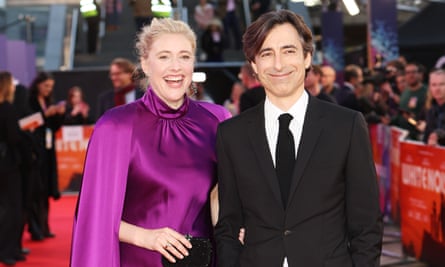
In Lady Bird, Ronan’s character announces: “I hate California, I want to go to the East Coast. I want to go where the culture is.” Gerwig did, too. She moved to New York City to study and spent the 2000s acting in small-scale, low-budget independent films in which she mostly improvised dialogue. Then came bigger productions: Greenberg, Frances Ha, Mistress America – subtly brilliant films that introduced her to the mainstream. To direct Little Women, Gerwig is said to have forced her way into a meeting with executives at Sony and persuaded them to give her the gig, though she had not directed before. (The film cost $42m to produce, and took $219m at the box office.) Gerwig met Baumbach when he cast her in Greenberg, and they wrote Frances Ha together. They became a couple, publicly, around 2013, following Baumbach’s separation from the actor Jennifer Jason Leigh, with whom he has a teenage son. They have since become a partnership at home and at work.
When I ask Gerwig to describe her relationship with Baumbach, she falters momentarily. “Oh, well, sure…” She laughs. “Well, I love working with Noah. He’s my favourite person to work with.” And then, “His opinion matters the most to me. I love making him laugh. It’s the best feeling. When he watches a cut and something makes him really laugh, I’m, like, ‘Got it!’ Because I would say I’m a much cheaper laugh than he is. He holds off until it really gets him. So, you know, it’s satisfying when you crack him.”
So, he makes her earn the laugh. “Yes,” she says. “But I’m an extrovert, he’s an introvert. I fling myself at life, he kind of… takes his time. You know, underneath it all, we both just love movies and art.”
I ask how it works at home, the being together and working together at the same time. “It’s all in there together,” she says. Nobody in the family escapes the intermingling. “My son last night, he said, ‘Are you going to dinner with Barbie?’” Gerwig, surprised by the comment, shook her head. “I was like, ‘No, no, you can’t go to dinner with Barbie.’ And he’s like, ‘Well, Dad told me he’s going to see Barbie!’”
Gerwig recognises herself in the actions of her older child. “Occasionally he’ll have these moments of high drama,” she says. “He’ll fall to the floor. He did this the other day. I wasn’t able to make him breakfast instantly, because I was feeding my three-month-old, and he fell to the floor, weeping and said, ‘I’m having a sorely trying day. It’s already a problem.’” Gerwig laughs. “I was like, ‘Oh, such drama.’ But also, like, ‘Oh, that’s from me.’ That’s my level of grandiose. And the part of him that’s more watchful, I think, ‘Oh, that’s Noah, that’s nice.’”
She goes on, “It’s all kind of one continuous thing. Luckily, I don’t get bored of it. You know, there’s lots of stuff we do that isn’t directly related to movies. But I think it’s the way both of us, in our different capacities, process the world. Through making and writing and imagining… It’s a lot. But I don’t think I would know how to really live any other way.”
Barbie is released in cinemas on 21 July
Greta Gerwig’s styling by Kate Young; hair by Ben Skervin; makeup by Daniel Martin

